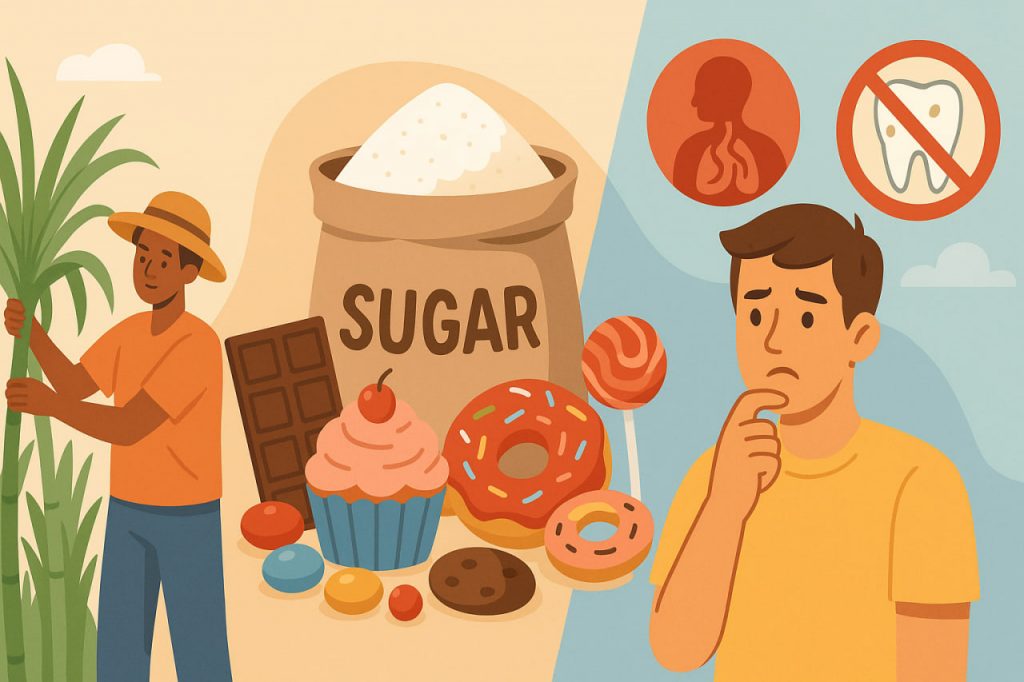Sugar has had a profound influence on human history, health, and economics. Its discovery dates back to around 500 BCE in ancient India, where people first learned to crystallize juice from sugarcane. The knowledge of sugar refining then spread through Persia, the Arab world, and later into Europe. Initially considered a luxury, sugar was used only by the elite for medicinal and culinary purposes. It wasn’t until the colonization of the Americas and the rise of plantation-based agriculture that sugar became widely available. As global production increased, sugar transformed from a rare spice into a daily food ingredient. Today, sugar is found in countless processed foods, though its health effects have become a growing concern.
Why Humans Love Sugar
The human brain naturally craves sweet flavors. Sweetness signals a quick source of energy, which was crucial for survival in ancient times. When we consume sugar, our brain releases dopamine, a chemical associated with pleasure and reward. This reaction makes sugar not only enjoyable but also potentially addictive. Evolution has hardwired us to favor calorie-dense, sweet foods, especially during times of scarcity. However, in today’s world of abundance, this biological preference can work against us. Regular exposure to high amounts of sugar may lead to strong cravings and habitual overconsumption.
How Sugar Affects the Body
Once consumed, sugar is rapidly absorbed into the bloodstream, raising blood glucose levels. In response, the pancreas releases insulin, a hormone that helps transport sugar into cells for energy or storage. Repeated spikes in blood sugar and insulin can lead to insulin resistance, a key factor in developing type 2 diabetes. In addition, excess sugar is often converted into fat, contributing to obesity and fatty liver disease. Studies also suggest that high sugar intake is linked to inflammation, which plays a role in heart disease and some cancers. Importantly, sugar does not provide essential nutrients — only empty calories.
Hidden Sources and Daily Overconsumption
Modern food products often contain added sugars, even those not considered sweet, like salad dressings, sauces, or breads. This makes it easy for people to exceed healthy sugar limits without realizing it. The World Health Organization (WHO) recommends limiting added sugar to less than 10% of total daily calories, ideally under 5%. Yet many people, especially in Western countries, consume two to three times that amount. The biggest contributors are sugar-sweetened beverages, candies, baked goods, and snacks. Labels can be misleading — sugar appears under many names like high-fructose corn syrup, dextrose, or maltose.
Natural vs. Added Sugar
Sugar found in whole fruits is less harmful due to the presence of fiber, water, and antioxidants. These elements slow down sugar absorption and reduce its impact on blood sugar levels. In contrast, refined sugars in processed foods are quickly absorbed and can lead to metabolic stress. For example, fructose, when consumed in large amounts through sweetened drinks, is metabolized in the liver and may promote fat storage. While fruits can be part of a healthy diet, large quantities of added sugar cannot. Nutrition experts emphasize replacing added sugar with whole foods for better health outcomes.
Conclusion
Sugar has shaped civilizations, driven economic empires, and become a daily pleasure for billions. However, its health effects are now clear: overconsumption contributes to obesity, diabetes, tooth decay, and chronic disease. While complete avoidance isn’t necessary, awareness and moderation are essential. Reading labels, limiting sugary drinks, and choosing natural foods can help reduce the negative effects of sugar. As we understand more about its impact, the key lies in informed decisions and balanced consumption.
Glossary
- Sugarcane – a tall plant from which sugar is extracted.
- Dopamine – a brain chemical linked to pleasure and reward.
- Insulin – a hormone that regulates blood sugar levels.
- Insulin resistance – when cells stop responding to insulin, increasing diabetes risk.
- Fructose – a natural sugar found in fruits and added sweeteners.
- Refined sugar – highly processed sugar with no nutritional value.
- High-fructose corn syrup – a common industrial sweetener used in soft drinks and processed foods.
- Obesity – a condition characterized by excessive body fat.


